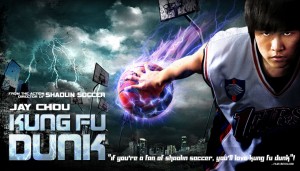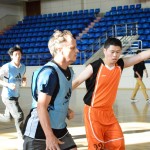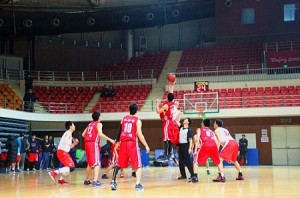* With Chinese Characteristics.
What follows is the bemused, inconclusive, but delightful tale of an “innocent abroad”, yours truly, trying hard to enjoy whatever taste of locally grown hoops he could find, and understand how it worked. Coach Howden was in the building. Several times! He was, though, a long way from his own hometown hardwood, and no one offered him a whistle or a clipboard.
I stole moments in my school’s gym over several November weekends, after I accidentally found out that there was an ongoing tournament for Dalian universities and colleges, 16 of ’em. College hoops! 15 minutes walk from Apartment 902! Who knew?
It’s pretty bad basketball, actually, which wasn’t news to me. I’ve known for years that Chinese universities, if they have teams, field poorly trained squads — never mind their Q scores, they are barely known (beyond their girlfriends) on their own campuses — that play a tournament or two and then disappear completely. Because, though, of a cinematic cheese-fest called Kung Fu Dunk (starring pop idol Zhou Jielun, “Jay Chou”) that I

Surely one of the silliest movies ever. The key fight-scenes were backed by Mr. Chou singing how his “kung fu” would turn hapless opponents into “tofu”. (It rhymes even better in Chinese.) Priceless.
watched during my first flight into Beijing, I knew there was something called the Chinese University Basketball Association. The university I taught at my first two years, Dalian Ligong Daxue, our nearby University of Technology, has had a women’s CUBA team for years; periodically, I’d see tall women trudging toward the outdoor stadium for wind sprints, or hang around after an indoor 4-on-4 game to watch them practice. No men’s team, though, at least not then, and why did Ligong have a women’s CUBA team, anyway? Apparently, some connections, and a willingness to admit under-achieving graduates of specialized sports schools and shepherd them through something approximating a degree, this at the top academic institution in our area, and possibly the province.
No men, though, until last spring I saw a lanky gang of sweat-suited guys on the strut, and learned that Ligong now had a “CUBA team”, however that happens, which hadn’t managed to qualify for the spring 2013 regional or national tournaments. As I’ve been able to piece it together, these lads come from basketball high schools, where they train for several hours daily and get what is acknowledged to be a substandard education. By the end of high school, their teams are mainly populated by the guys not good/big enough to get scooped up by pro teams and their junior development squads at age 15 or 16 (in the way of a Yao Ming or an Yi Jianlian), so it seems they play on though any pro ambitions have already been snuffed. By university, this is even more of a fait accompli.
My happy accident – so basketball-starved am I – happened on a Thursday night at a pricey tutorial English school in a ritzy new mall, where I razzle-dazzle’em for a couple of hours. I immediately noticed the tall young woman, maybe (sort of) recognized her – at any rate, I wasn’t surprised to discover she was a “PF” from Ligong. (Even the players often don’t know that PF stands for ‘power forward’ or SG for ‘shooting guard’, but most Chinese speak fluent acronym.) She does some kind of Master’s degree, and is now in her seventh year playing for the school’s CUBA squad. (Gotta be some kind of “Most Valuable Admission” award there; I can’t imagine that most of them stay past an undergrad diploma.) Through two Thursdays of tangled attempts at communication (her English isn’t much better than my Chinese), I found out that there was a Dalian tournament for the city’s 16 university/college men’s teams. Nice!
As I figured, the teams were largely uncoached, though as at every Chinese university, there are some good athletes who’ve barely played before the age of 18 or so. Young men love the game here, and largely teach themselves using on-line highlight videos and defence-free four-on-four on the outdoor courts that all schools have. For most, hoops happen this late because the university entrance exam is a monster that swallows all life balance and pleasure. Nobody here calls high school “the best years”. In my own pickup games at Ligong, and at my current school, Dongbei Caijing Daxue (“Dongcai” for short), I’d already seen players like this, and it’s amazing how good some of them get. What’s new in this year’s tourney is that the Ligong CUBA team from Ligong has chosen (or has been required; I’m still fuzzy about this) to compete: two 8-team pools, teams play three games per weekend (guessing), eight teams made the quarters (more guessing), single elimination from there to see which three teams would advance to Shenyang, the provincial capital, for the next level of competition. Understand: I don’t read Chinese at all, speak it sketchily, and the ballplayers don’t have much English beyond cursing.
Anyway, short story long, I caught this “superteam” on a Friday night. I’d noticed them the previous weekend, lounging after another blow-out victory, and how much bigger and well-uniformed they were than the other slightly glorified intramural teams. I was sorely disappointed and even briefly and (almost) unaccountably enraged to finally see them play. They’re awful. They’re winning too easily, so yeah, I understand a certain laxity, but they were a clown show at times in winning by 40, and the coach seemed pretty much inert from my perch on the baseline nearest their bench. Plays? Occasionally, there seemed to be a plan, but corrections? Teaching? Discipline? Attention to defence? Didn’t see a sign. It’s true I couldn’t understand his words, but they were few anyway, and his body language was easy to read. Their daily training must be of a fairly languid sort, as they played only the most laconic of defence, and post players often walked a good part of the way back towards the guarding end of the floor.
Like the thrown-together teams in this tournament, they played the apparently Party-approved, flat-footed 2-3 zone that every Chinese team short of the pros plays. (Some of them do,too.) At the end of the half, they got into a bench-clearing near-brawl in an attempt to strut and intimidate their much-smaller opponents, one of whom had had the temerity to not kow-tow to a Ligong post player. The coach didn’t move off the bench, but then the referees didn’t do anything, either. These guys are a disgrace-in-waiting. By the second half, some back-up post, about 6’3”, repeatedly lowered his shoulders, bumped the skinny little guy guarding him, and scored with ease, and then he’d throw his chest out and stare at his overmatched opposite number. Once, he walked through the key to his free-throw shooting teammate and whispered an instruction. Miss. His scheme to make a splashy put-back of an intentional miss went wrong anyway. Yikes. Gong show.
The opponent had few fans, and if the Ligong girlfriends were there, they were silent. At one point, this muscular bully of an undersized post player blew my mind. (It might have been the preening for the absent cameras after a pretty ordinary uncontested dunk he got after not bothering to go back on defence. I wasn’t quiet in my indignation and dismay – my only defence is that sports are sacred to me, and this team and this guy were taking a crap in my church – but thanks to the cultural divide it’s possible they interpreted my loud sarcasm — it was something like “Why is he so good!?!” — as enthusiastic approval. I got my hot-headed arse back in its seat pretty quickly, and I put on a big grin.
And sure enough, when the team went by my lonely spot in the stands post-game, and I wanted to ask some questions, it was Mr. Li, the substitute forward and resident bully/narcissist, who volunteered as having the best English. We had a pleasant, if limited, conversation. Even when I pushed him a little about his mockery of opponents, he just shrugged, smiled and said, “I’m bad boy. Just have a little fun.” I learned some details, and I told him/them I’d been a long-time coach in Canada; he’d wondered what in the world I was doing there. He told me the (sad, to me) story of his athletic arc, that his high school team had won a national championship tournament five years before. I’m not sure whether he was a key player on that team, but one comment was the most telling: “I much better then. Not so good now.” We smiled and shook hands, he popped a cigarette in his mouth and headed with his teammates to the exit. “I’m bad boy.”
The next weekend, I ran into the Ligong boys again on my way to see them play the final. Unfortunately, they were on their way home from having won, which saved me some time, I guess, and certainly some needless irritation. I still don’t know whether the game time was changed – who watches these things? – or my communications hotline shorted out. At any rate, young Li said they’d won with ease over my school, Dongcai. (Or was it the “Traffic University”?) I couldn’t help being arrogant enough to think I could beat Ligong if I was given a month or two to train the small, quick Traffic boys. My wanting to take over is a routinely self-immolating impulse, and it would likely drive me nuts; foreign coaches have wildly frustrating experiences here. (Doesn’t mean I was wrong, my coaching ego insists.)
I bumped into Bao Yang at school. Bao’s a nice kid: the captain, assistant coach and best player for our college’s intramural team. Last year, he also played – the only guy on the team who’d passed the university entrance exam – for Dongcai’s “varsity”, an aspiring CUBA team, which had won the 2012 city tournament in Ligong’s absence. He knew the results of the provincial competition from the previous weekend: Ligong had won, Dongcai came 6th, which I think means that Ligong has qualified for one of the CUBA’s four regional tournaments. Bao Yang wasn’t sure; was there some other competitive route by which CUBA teams won their way to regionals? When even he didn’t know, I realized that my difficulties weren’t only the result of linguistic retardation.
Regionals, the poster in the Dongcai gym might have said, will be next March. (Or April.) Dongbei (Northeast, or “east-north” as Chinese phrases it), Xibei, Xinan and Dongnan regions will each send four teams to the national tournament, whenever that is. I have a perverse curiosity to go see the finals, in spite of my ace China hoops source in Beijing’s dismissive comment that “it sucks”. Yeah, but how badly does it suck? I need to know these things! What to do? I (try to) satisfy myself by writing too-lengthy, why-should-anybody-care accounts for innocent browsers, convicted basketball accomplices and China

A rare chance for the ol’ guy to play full-court on (artificial) hardwood. I’m sure something spectacular was about to happen here, and I wasn’t thinking of coaching at all.
junkies. (Hello, everyone!) The Good News: because I can’t coach, I play more, and I’ve gotten some of my body back. Writing bad basketball and playing worse is no cure for the madness of coaching, but they help sometimes. Any port in a storm, my mother used to say.


James Howden, you can’t take the boy out of the man or the basketball out of an old coach! Did you lay a whupping on those up-starts? Still got crazy feet? I haven’t played for years because of arthritis in my ankles but I can sure appreciate how you would like to straighten out a team of “bad boys”. I once played pick-up on an outdoor court in Manila and the kids wanted to know if I was on a Canadian “pro” team. I told them (at the time) that Canada didn’t have a pro team. Lucky answer.
Take care, be safe. Regards.